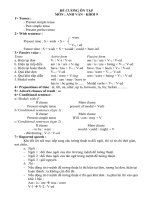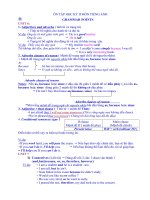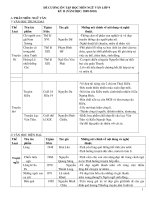ÔN tập học kỳ II ANH 9 21 22 kđ
Bạn đang xem bản rút gọn của tài liệu. Xem và tải ngay bản đầy đủ của tài liệu tại đây (127.72 KB, 7 trang )
•
•
•
PHỊNG GD&ĐT NÚI THÀNH
TRƯỜNG THCS KIM ĐỒNG
HƯỚNG DẪN ƠN TẬP KIỂM TRA HKII NĂM HỌC 2021-2022
(CHƯƠNG TRÌNH 7 NĂM)
(Kèm theo Công văn số 637/ SGDĐT-GDTrH ngày 08 tháng 4 năm 2022)
MÔN TIẾNG ANH 9
NỘI DUNG
Pronunciation: Distinguish vowels and consonants: /t/- /d/ - /id/, / i / - /e/
A. ÔN
Vocabulary related to Unit 6 – Unit 9
VOCABULARY
TẬP
Adverbs of manner
AND GRAMMAR
KIẾN
Speaking: compliments and suggestions
THỨC
Verb forms: Tenses and Passive voice
Relative clauses
Conditional types
Connectives
Adjective + that clause
Phrasal verbs
Prepositions
Read the text about the topic about Celebrations and fill in the gaps with
READING
suitable words from the box.
Read the text again and answer the questions
Make arrangements, rewrite, and complete the sentences about:
WRITING
Adverbs of manner
Making suggestions
Connectives
Relative clause
Adjective + to - inf
Adjective + that clause
LISTENING
- Environment
- Saving energy
CHUNG:
1. ADVERBS OF MANNER (Trạng từ chỉ thể cách) Trạng từ chỉ thể cách là từ bổ nghĩa cho :
Động từ: The old man walked slowly to the park. (đứng sau động từ (walked)
She drive s the car quickly. (đứng sau tân ngữ : the car)
Tính từ : Hoa was extremely pleased that she got an A for her assignment. (đứng trước tính từ ( pleased)
Xem và làm bài tâp về tính từ (adjectives) và trạng từ (adverbs) trang 54 sách Tiếng Anh 9
2. ADVERB CLAUSES OF REASON (Mệnh đề trạng ngữ chỉ lý do): Mệnh đề trạng ngữ chỉ lý do là mệnh đề
phụ để trả lời cho câu hỏi với “why”(tại sao), và thường được bắt đầu bằng liên từ: because/ as/ since (bởi vì)
Ex: Ba is tired. He stayed up late watching TV Ba is tired because / as / since he stayed up late watching TV.
*Xem và làm bài tâp về mệnh đề trạng ngữ chỉ lý do trang 54 sách Tiếng Anh 9
3. ADJECTIVE +THAT CLAUSE (Tính từ theo sau là mệnh đề với “that”)
Một số tính từ mô tả cảm xúc hoặc thái độ của người như : pleased , excited , sorry , happy, glad, dissapointed,
amazed… theo sau là mệnh đề với “that”
Ex: I’m pleased that you are working hard.
*Xem và làm bài tâp về Tính từ theo sau là mệnh đề với “that” trang 55 sách Tiếng Anh 9
4. CONNECTIVES (Liên từ ): and (và- dùng để nối thêm ý vào mệnh đề trước), but (nhưng- đưa ra một ý tương
phản với mệnh đề trước nó),, or (hay là- nói lên sự lựa chọn), , therefore (do vậy- nói lên kết quả của ý thứ nhất),
however (tuy vậy, tuy nhiên- dùng cho ý tương phản với ý thứ nhất)
*Xem và làm bài tâp về Liên từ trang 62-63 sách Tiếng Anh 9
1
5. ADVERB CLAUSES OF CONCESSION (Mệnh đề trạng ngữ chỉ sự nhượng bộ): Mệnh đề trạng ngữ chỉ sự
nhượng bộ bắt đầu bằng một liên từ chỉ sự nhượng bộ: although/ though/ even though (dù/ mặc dù). Ngồi ra ta
cịn có thể thành lập nhóm từ chỉ sự nhượng bộ với các giới từ như Despite, Inspite of (mặc dù )
*Xem và làm bài tâp về mệnh đề trạng ngữ chỉ sự nhượng bộ trang 71-72 sách Tiếng Anh 9
6. RELATIVE CLAUSES WITH “WHO”, “WHICH” OR “WHOM” AS A SUBJECT OR AN OBJECT:
Mệnh đề quan hệ với” Who”, “Which” hoặc “Whom” làm chủ ngữ hoặc tân ngữ
Mệnh đề quan hệ có chức năng bổ nghĩa cho danh từ đứng ngay trước nó nên cịn được gọi là mệnh đề tính từ.
Mệnh đề quan hệ thường được bắt đầu bằng một đại từ quan hệ hoặc một trạng từ quan hệ.
+ Đại từ quan hệ “WHO”: thay thế cho danh từ hoăc đại từ chỉ người làm chủ ngữ trong mệnh đề quan hệ.
+ Đại từ quan hệ “WHICH”: thay thế cho danh từ hoặc đại từ chỉ vật làm chủ ngữ hoặc tân ngữ trong mệnh đề
quan hệ.
+ Đại từ quan hệ “WHOM”: thay thế cho danh từ hoăc đại từ chỉ người làm tân ngữ trong mệnh đề quan hệ.
*Xem và làm bài tâp về Mệnh đề quan hệ trang 70-71 và 81 sách Tiếng Anh 9
7. CONDITIONAL SENTENCES - TYPE 1: (Câu diều kiện loại 1)
Câu điều kiện loại 1 dùng để diễn tả một khả năng có thể xảy ra hoặc thành hiện thực ở hiện tại hoặc tương lai.
Ex: If we work hard, we'll make this beach a clean and beautiful place again.
* Form:
If clause
Main clause
The simple present:
The simple future: Thì tương lai đơn
If + S + V (-s/es) …
S + will/ can... + V(infinitive)…
*Xem và làm bài tâp về Câu diều kiện loại 1 BT 4,5 trang 56 sách Tiếng Anh 9
8. PHRASAL VERBS (động từ ghép):
turn off (tắt), turn on (mở), look after (chăm sóc, trơng nom), look for (tìm kiếm), go on (tiếp tục)
*Xem và làm bài tâp về động từ ghép trang 63 sách Tiếng Anh 9
9. MAKING SUGGESTIONS: (lời đề nghị)
a. S+ suggest + V-ing : I suggest giving lessons to poor children.
b. S+ suggest (that) +S+ should +V(inf) : I suggest (that) you should take a shower instead of a bath to save
water.
10. PREPOSITIONS:
- divide into: chia thành
- go on: tiếp tục
- prevent … from: ngăn ngừa
- congratulate/ congratulation … on
- save … from: cứu, cứu thoát
- cope with: đương đầu với
- distinguish … from: phân biệt với
- turn on: mở ≠ turn off : tắt
- different … from: khác biệt với
- turn down: vặn nhỏ ≠ turn up: vặn lớn
- keep on: cứ, tiếp tục làm
- sense of humor: tính hài hước
- instead of : thay vì
- come from: đến từ, bắt nguồn từ
- account for: chiếm
- look forward to: trơng đợi, mong mỏi
- be interested in: thích, quan tâm
- help … with: giúp ai
- sum up: kết luận
- proud of: tự hào về
- look for: tìm kiếm
- kind/ nice of
- look after = take care of: trông nom, chăm sóc
- take part in = join in: tham gia
- just in case: dự phòng
- known as: được biết như là
- satisfy with: thỏa mãn với
- get out of : thoát khỏi
- between…and: giữa
11. GIVING AND RESPONDING TO COMPLIMENTS (Đưa ra và đáp lại lời khen ngợi)
Giving a compliment
Responding to a compliment
Well done!
Thanks
That’s a great / an excellent……
It’s nice of you to say so.
Let me congratulate you on……..
That’s very kind of you.
12. GIVING AND RESPONDING TO SUGGESTIONS:
2
Suggestions
Responds
I suggest + V-ing……
OK.
I think we should………..
That’s a good idea.
Shall we……?
All right.
Why don’t we…….?
No, I don’t want to.
How about + V-ing……?
I prefer to….
What about + V-ing…….?
Let’s…
Let’s….
13. ƠN LẠI CÁC THÌ : HIỆN TẠI ĐƠN, QUÁ KHỨ ĐƠN, QUÁ KHỨ TIẾP DIỄN, HIỆN TẠI HOÀN
THÀNH
14. PASSIVE FORM ( THỂ BỊ ĐỘNG)
Active (Chủ động) S
+ V + O
Pasive (bị động): S+ be+ p.p+ (by+ O) (S: chủ ngữ, V: động từ, O: tân ngữ , be: động từ “tobe”, P.P: V-ed/ V3)
1. Bị động của thì Hiện tại đơn: S + am / is / are + P.P……..
2. Bị động của thì Quá khứ đơn: S+ was / were +P.P………….
3. Bị động của thì Quá khứ tiếp diễn: S + was / were + being + P.P……….
4. Bị động của thì Hiện tại hoàn thành: S + has / have + been + P.P………..
5. Bị động của Modal verbs (will/can/must/ should/ ought to..: S + modal verbs + be +P.P...
B. EXERCISES:
I. Chọn từ có phần gạch chân được phát âm khác với những từ còn lại trong mỗi câu:
1. A. intermediate/i/
B. immediate/i/
C. medium/i/
D. medicine/e/
2. A. minimize/ai/
B. ideal/ai/
C. pesticide /ai/
D. sensible/e/
3. A. energy/e/
B. recently/i/
C. suggest/e/
D. effective/e/
4. A. prepare/i/
B. prepayment/i/ C. preposition/e/
D. prescribe/i/
5. A. receive /i/
B. replace/i/
C. regularly/e/
D. reduce/i/
6. A. prevent/i/
B. press/e
C. prepare/i/
D. prescript/i/
7. A. saved
B. helped
C. installed
D. satisfied
8. A. traveled
B. discovered
C. warned
D. walked
9. A. brushed
B. touched
C. stopped
D. rented
10. A. saved
B. helped
C. installed
D. satisfied
11. A. traveled
B. discovered
C. warned
D. walked
11 A. needed
B. started
C. brushed
D. fitted
12. A. borrowed
B. stopped
C. looked
D. watched
II. Chọn đáp án đúng để hoàn thành câu:
1. She is very tired.................., she has to finish her homework. ( but / so / therefore/ however)
2. Is he an actor ...............a singer? -An actor. ( and / or / with /so)
3. I suggest ...............money for the poor people in our neighborhood. ( save /to save/ saving/saved)
4. Who looks ................your children when you are away from home?( for / at /after / to)
5. He got wet ...............he forgot his umbrella. ( so / because / but /and)
6. She studies well...............she is busy.( but/ since /although /and)
7. We ...............since we left school. (don’t meet / didn’t meet /won’t meet /haven’t met)
8. In 1995, a huge earthquake ..............the city of Kobe in Japan. (strikes/ struck/ is striking/ has striken)
9. I can’t hear what you are saying. Can you......the radio? (turn on /turn off / turn up /turn over)
10. This test must be done.................... (carefully/ carelessly/careful /careless)
11.If he………… free time, he will go swimming. (has /had /will have / is having)
12. If the………………… continues, what will happen?(pollution/ pollute
/ polluted /polluting)
13. Remember to turn ………….. the lights before going to bed.( of /off/ on / up)
14. According to the weather …, it will be raining tonight. (forecast/ forecaster/ forecasted /forecasting
15. Hue will have temperatures ……… 230C and 270C. (at /between/ in /with )
16. The children laughed……… when they were watching a comic.(unhappy/ happy/ happily/ unhappily).
3
17. There is too much traffic. ………………., the air is polluted. (However/ Since/ Therefore/ But)
18. Mai speaks English quite ………. (fluent/ good / well / better)
19. A tropical storm is called a………………… in Australia. (hurricane/ cyclone /typhoon/ tornado)
20. She sings very …………….(beauty /beautify/beautiful / beautifully)
21. If it _____________ , we will go to the movies (doesn't rain /didn't rain/ hadn't rained/ won't rain)
22. Hoa was very sorry ………. she broke her friend’s bike. (with / that / which / when)
23. If we go on wasting water, there……a shortage of fresh water in a few decades. ( is / are / will be / won’t be)
24. In order to save electricity, an ordinary 100-watt light bulb can be replaced by ……. bulb.
( an energy-saving / an energy- save / a saving-energy / a save-energy)
25. A funnel-shaped storm passing overland below a thunderstorm is called a …….
( typhoons / tsunami / tornado / hurricane)
26A: Shall we go out for a meal?B: ……( Not at all / All right / Yes, thanks / You’re welcome)
27. A; Congratulations to you on winning the first prize. B: ……
( You’re welcome/ Thanks a lot / It’s my pleasure / OK)
28. A: I passed the test, Mom. B: …….. ( Well done / Good luck / All right / Thank you)
29. A: How about making posters on energy saving and hanging them around our school?
B: …….. ( Well done / Great! Let’s do that / Thanks / It’s nice of you to say so)
30. Nam: Good job on your report! I think the teacher will like it.
David: ______ ( I think, she doesn’t/ It’s very nice of you to say so/ Let me congratulate you/ Well done) .
31. Lan: “Well done, Anna! You have won the 1st prize!” Anna: “____________.”
A. I’m glad that you like it C. It is very nice of you to say so B. You are welcome
D. You can say it again
III. Điền một từ thích hợp vào chỗ trống:
1. I suggest ……getting……… a plumber check the pipes in your house regularly.
2. Hoa failed her test……therefore…., she has to do the test again.
3. …although…… Tuan is very tired, he has to finish his homework before going to bed.
4. Lan is a very good student. ……but….., Nam is much better than her.
5. The streams will be covered …with……. foam.
6. I’m sorry ……that……. I broke your bike.
7. If we …go on…….. litering, the environment will be seriously polluted.
8. Solar ennergy doesn’t cause ……pollution………….
9. If we go on ……wasling……… water, we will have no fresh water to use.
10.Typhoon, hurrican and tropical storm are different words for the same natural ……………
IV. Viết thành câu có nghĩa từ những gợi ý sau:
1. She / going / to be / late / work / since / the traffic / busy.- --------------------------------------------- She is going to
be late for work since the traffic is busy
2. I’d love / play / volleyball / but / I / have / complete / homework.
I’d love to play volleyball but I have to complete my homework
3. Have / police / find / man / steal / car / yet? - -------------------------------------------------------------Have the police
found man who stole your car yet?
4. If / we / go on / waste / water, / there / be / a great shortage/ of fresh water / the near future/.
- If we go on wasting water, there will be a shortage of fresh water in the near future
5. I / suggest /take / a shower / instead / a bath / save energy. /
I suggest taking a shower instead of a bath to save energy.
- ------------------------------------------------------------------------------------V. Hoàn thành câu bên dưới sao cho nghĩa của nó khơng thay đổi so với câu đã cho:
1. Liz has an exam tomorrow but she is still watching TV now. –//
Although Liz has an exam tomorrow, she is still watching TV now
2. I think it would be a good idea to have a picnic near a lake.
>I suggest having a picnic near a lake.
I suggest that we should have a picnic near a lake.
3. I have to finish my homework first although I’d like to play soccer with you. (however)
4
→I’d like to play soccer with you however i have to finish my homework first
4. Practice your English regularly or your English does not improve.
If you don't practice speaking English every day, you can't improve your English.
- If you practice your English regularly, your English will improve
5. Lan broke the vase because of her carelessness. //
- Since Lan was careless,she broke the vase.
6. Why don’t you make posters on energy saving?
– I suggest that you should make posters on energy saving.
VII.Sắp xếp từ bị xáo trộn thành câu hoàn chỉnh:
1. live/ Tet / to / Family / together / be / members / apart / at / who / try
Family members who live apart try to get together at Tet.
2. which / he / tell / cultures / different / likes / about / and / reading / peoples / books.
he like reading books which tell about different peoples and their cultures
3. the / in / Most / the / occur / of / Fire / the / world / in /of / earthquakes / Ring.//
-Most of the earthquakes in the world occur in the Ring of Fire.
4. predict / Scientists / will / a / can / volcano / when / erupt / usually/.
- Scientists can usually predict when a volcano will erupt.
5. solar / Many / are / countries / in / already / the / using / energy / world.
……………………………………………………………………………..
6. which / funnel-shaped / a / below/ pass / storms / Tornadoes / are / overland / thunderstorm///
Tornadoes are funnel-shaped storms which pass overland below a thunderstorm
VII.Nối các cặp câu : Use WHO or WHICH.
1. My brother is the man. He is wearing jeans
2. The man is my brother. He is wearing jeans.
3. I am looking for a book. The book tells about festivals in China.
4. Last week I visited a house. The house was built 100 years ago..
5. The bus was crowded with passengers. It took us to school this morning.
.
6. Tuan works very hard. He is sitting next to Nam.
.
7. I like the cartoon. The cartoon was shown on TV last night.
8. Ba lives on Le Loi Street. He likes playing the guitar.
.
@Read carefully the passage: chủ đề CELEBRATIONS
1. Đọc đoạn văn và làm các bài tập bên dưới
A . Complete the passage with the words from the box
popular day
where
Occurs
areas
century
FATHER’S DAY
Many Australians (0)________ Father’s Day which (1)__ ______ on the first Sunday of September. In
Australia, Father’s Day is not a public holiday. It falls on a Sunday, which is a day off for many workers so many
offices are closed. However, some shopping (2)_ __ and stores, as well as restaurants, cafes and entertainment
centres may be busy on this day, especially in areas (3)__ ________ Sunday trading is allowed.
The idea of a special (4)_ _________ to honor fathers and celebrate fatherhood was introduced from the
United States. A woman called Sonora Smart Dodd was inspired by the American Mother's Day celebrations and
planned a day to honor fathers early in the 20 th (5)_______ ______. The first Father's Day was celebrated in
Spokane, Washington on June 19, 1910. Father’s Day has become increasingly (6………..
5
B. Answer the questions:
1. On what day is Father’s Day celebrated in Australia?→
2. Why are many offices closed on Father’s Day?→
2. Đọc đoạn văn và làm các bài tập bên dưới thứ 4 giải tiếp
A. Complete the passage with the words from the box: (1.5pts)
housework – enjoys – best – traditional – for -
In the Unites States, people celebrate Mother’s Day (1) ________ Father’s Day. Mother’s Day is celebrated on the
second Sunday in May. On this occasion, mother usually receives greeting cards and gifts from her husband and
children. The (2) ________ gift of all for an American Mom is a day of leisure. The majority of American
mothers have outside jobs as well as (3) ________ , so their working days are often very hard. The working
mother (4) ________ the traditional Mother’s Day custom of breakfast cooked by her family and served to her on
a tray in bed. Later in that day, it’s also (5) ________ for the extended family group to get together (6) ________
dinner, either in a restaurant or in one of their homes.
Flower is an important part of Mother’s Day. Mothers are often given a plant for the occasion, particularly if they
are elderly.
B. Answer the questions: (1pt).
1. When do American people celebrate Mother’s Day? .→…………………………………………
2. What is an important part of Mother’s Day?.→…………………………………………
3. Đọc đoạn văn và làm các bài tập bên dưới .
Carnival Festival is a party which lasts for four days. It is (1)____ in late February or early March each year in
Brazil. There are Carnivals all over Brazil, but the most famous one is in Rio de Janeiro. On these days, the city is
(2)____ with colorful lights. Everyone is very friendly to each other, especially to visitors from other countries.
The best part of the Carnival is the big parade. People (3)____ in attractive costumes which are prepared for
months. It is really fantastic to watch. People (4)____ the samba in the streets and visitors are also welcome to
dance. I think you should go to Brazil for Carnival Festival if you ever have the chance.
A. Hoàn thành đoạn văn trên dùng các từ đã cho dưới đây. Lưu ý có một từ khơng dùng.
dance, held, decorated, dress, have
B. Các câu sau đây đúng hay sai so với đoạn văn. Nếu đúng, điền (Đ) và sai, điền (S) vào sau mỗi câu.
1. The Carnival lasts for more than one week.
2. There is a big parade during the Carnival days.
@ Listening: CHỦ ĐỀ ENVIRONMENT VÀ ENERGY
Part 1. Listen to Mrs. Mi talking with Mrs. Ha, her neighbor. Write to complete the following sentences .
1. Mrs. Ha is worried about her__________ __________.
2. Mrs Mi suggests checking cracks in the pipes to reduce ____ ______ ____ water the family uses.
3. Mrs. Ha’s water bill is ______________, 200,000 dong.
4.Mrs Mi suggests ___________ ___________ instead of baths.
Part 2: Listen to the text about the volunteer conservationists doing to protect the environment, and match the
names in column A with the tasks in column B: (1.0 pt)
7. Group 1
_______
A. Check the sand.
8. Group 2
_______
B. Check among the rocks.
9. Group 3
_______
C. Collect all the bags and take them to the garbage dump.
10. Mr. Jones
_______
D. Walk along the shore.
Part 3: Listen and fill in the blanks with suitable words from the box:
provided effective nuclear pollution sun electricity
Are you looking for a cheap, clean, (1) _____________ source of power that doesn't cause (2) _____________ or
waste natural resources? Look no further than solar energy from our sun.
At present, most of our (3) ____________ comes from the use of coal and gas, oil or (4) ___________ power. This
power could be (5) ____________ by the sun.
6
Many countries are already using solar energy. Solar panels are placed on the roof of a house to receive the energy
from the (6) ___________. The energy can be stored for a number of days, so on cloudy days you can use solar
energy, too.
Part 5: Listen and fill in the blanks with suitable words
Our oceans are becoming extremely.................. Most of this pollution comes from the................., which means it
comes from people. Firstly there is raw sewage, which is .............directly into the sea. Many.................both
developed and developing, are guilty of doing this. Secondly,.....................drop about ........million tons of garbage
into the sea each year. Thirdly, there are .........spills from ships. A ship has an...........and oil leaks from the ............
This not only...............the water but also ............marine life. Next, there are .......................from factories. Without
proper regulations, factory...........let the waste run directly into the rivers, which then leads to the sea. And finally,
oil is .........from the land. This can be the result of carelessness or a deliberate dumping of water.
7









